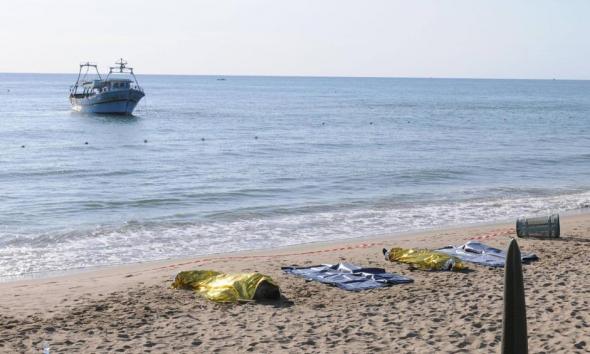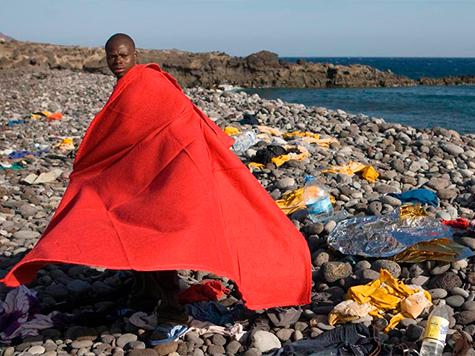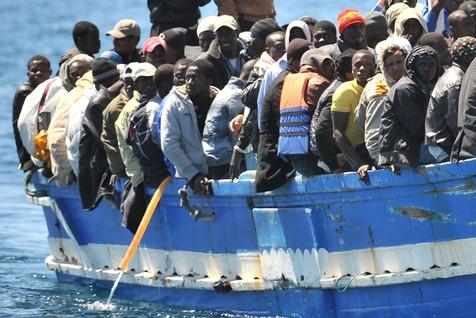We are all illegal
From Melilla to Poland, Cypress to the Canaries, thousands of people daily attempt to leave their places of origin and reach the European continent in search of better living conditions, leaving behind the most varied settings – wars, fires, droughts, floods, repressive regimes, massive unemployment, poverty wages, fundamentalists – and confronting, everywhere, the same repressive strategy, the same barriers and persecution, the same racism and the same violence.
It may be thought that these people who cross oceans, deserts and mountains, hostile territories and foreign countries, would be victims of misunderstandings or police excesses, but this is not the case. The immigrants seeking to reach Europe are confronted with practices, objectives and instruments chosen within European institutions and approved by individuals who were elected by European citizens. In short, they are faced with methods of inhuman violence and with a repression that we have come to associate with dictatorial states, all of which was decided “democratically.” It is called “Frontex” and it is a group of devices controlling migratory movements toward Europe. It includes warships patrolling the coast, fences in Melilla and Ceuta, detention centers scattered throughout Europe, deportations on board aircraft companies such as Ibéria and Lufthansa. But also the persecution of immigrants across the continent – from those who pick up their children from school to those who are shot by the police in the suburbs of large cities – the raids of the Serviço de Estrangeiros e Fronteiras and the imposition of DNA tests for the purposes of family reunification. It includes, increasingly, diplomatic relations with the EU’s neighboring states, which are assuming the most odious aspects of the repression of immigrants, with the multiplication of detention centers in the Maghreb and the ongoing practice of genocide, in Morocco, in recent years.
Control of migratory movements of this magnitude could never be accomplished merely by legal and institutional methods; state repression intersects here with tolerance, if not more or less underground cooperation, for criminal organizations, so as to ensure that immigrants who pass through the tight meshes of this control remain, above all, invisible in the countries where they remain: illegal and dependent, always fearful of deportation or reprisals against their families, and obedient. The xenophobic propaganda of the extreme right, the more or less subtle racism of institutions (which begins in the school and ends in local governments) and the sensationalism of the media see to the rest – they set the tone and guide the attitudes towards legitimizing every kind of repressive measure on immigrants.

All this that is occurring in Europe and on its borders deserves, without any exaggeration, the classification of an ongoing war. A war where the enemy is permanently constructed and characterized as a possible threat to social peace, a disturbing element, which has an irrationality that distinguishes it from European citizens. A war where the enemy is the foreigner in which we don’t recognize ourselves, whose difference allows the construction of an identity that includes ourselves and excludes him, until we see him as a thing and become incapable of seeing him as a person.
All this is as old as the very idea of “border.” The Greeks called those who did not share their language and their customs “barbarians.” The Romans used the term to describe all people who were located beyond the borders (“Limes” - the limit) of their empire and who did not accept their sovereignty. In their maps of Africa, what existed beyond that which they conquered was described with the expression “Hic sunt leones,” a wild territory whose sovereignty belonged to the wolves. Chinese emperors ordered the construction of an enormous wall to stop the invasions of nomadic peoples of Siberia and Mongolia. Later, the Portuguese and Spanish kings divided the world in half with an imaginary line that would be the boundary between their colonial domains. All this before the European powers were seated at a table in Berlin, at the end of the nineteenth century, to trace the ruler and triangle, tailored to their conveniences and with the known results: the boundaries of their colonies in Africa. People and communities were grouped together or separated depending on the feasibility of communication or the existence of certain natural resources, military conquest or trade routes – in all cases based on the ongoing colonization and interests of the colonizers. And in all these cases the “border” was always, simultaneously, a line drawn on paper, an effective military and repressive power, a discourse of legitimization of violence based on the superiority of the colonizers over the colonized, a permanent construction of collective identities capable of supporting profoundly unjust social relations.
The historical precedents illustrate the nature of the “border”, but are insufficient to explain the processes underway. For its size, the current phenomenon of migration assumes new, and until now unknown, aspects. On the other hand, control techniques, conditioning and repression are more sophisticated than ever before, giving the “border” a materiality that it has never had. This materiality seems unavoidable, its arm as long as is necessary, its eye capable of seeing all, its legitimacy unquestionable.
Perhaps this is why the discourse on immigration that seeks to combat xenophobia and racism tends to incorporate the language of its adversary and to accept borders as bad, but necessary, things. They speak of rights to negotiate, of promoting integration, of correcting excesses. Of the need that “Europe” has of immigrants to “do the jobs that Europeans no longer want to do” and to “stabilize the demographic balance.” Of respect for their “identity and difference.” Of the need for an “immigration policy,” capable of uniting the objectives of the state with solidarity and respect towards immigrants. All these discourses of pacification contrast, more and more unbearably, with the reality of an ongoing war against immigrants. They enter each fight in a defensive and hopeful position, in which they try to reclaim rights, appealing to governments for the need and desirability of introducing a little “Christian spirit” in the treatment of immigrants.

What the evolution of the repressive provisions grouped under the term “border” has come to demonstrate is a broad consensus of political forces in the European Union on the need to control immigration and outlaw the movement of the overwhelming majority of people seeking to enter the continent. The “border” is the instrument that allows them to regulate the migratory flow depending on the needs of the business and services workforce, but is also the argument that permits greater police powers, and multiplies “states of exception,” creating zones where legality is suspended and the balance of power fully assumed. The “war on terror,” with the multiplication of potential “threats to internal security” and a scientific exploration of fear and xenophobia against Muslims, has come to reinforce this trend and sanction the militarization of the border to the south, turning the Mediterranean into an undulating graveyard.
But with the strengthening of the borders and the powers of the state to ingest people’s lives, it is the entire society that is being militarized. The “border” is not only the limits of national territory, but also the disciplinary logic that operates within it. The very existence of a police force and a special bureaucracy to deal with the “foreigners” is the logical development of the “border”, the trivialization of the separation, within each country, between citizens and those excluded from citizenship, of the granting of different rights depending on the provenance, of an “apartheid” whose nature becomes fully explicit with the denial of citizenship to children of immigrants born in the “host” country. The “border” is an entire program and its operation runs and encompasses the totality of social relations. Without it, nothing is understood about the nature of racism, xenophobia, police repression, the nature of the state.

In this context, the fight against this process cannot merely denounce this or that abuse, claiming this or that right, to defend this or that group of immigrants. It is necessary to reject the logic that lies at the heart of the “border”: the separation of individuals according to the sovereignty of states. Fighting the oppression of immigrants implies keeping in mind that such separation is desired and constantly constructed through a political program of broad scope, shared by a group of political and economic elites on a worldwide scale.
Promoting, to the contrary, communication and cooperation between those that the boundaries separate, implies rejecting the defensive position of one who makes requests and taking the offensive position of one who collectively builds their own path, imposing their existence and their presence, regardless of institutional logic. Collectively disarming the repressive apparatus of the state, dismantling the legitimacy of their action, disputing the public space, taking to the streets and making visible what the “border” wants to keep obscure is the only plan that lets you win the dirty war put into practice against the immigrants in the European Union. In it, we are all potential targets, but also irregular combatants. In it, we are all illegal.
Jogos Sem Fronteiras, edições Antipáticas, 2008